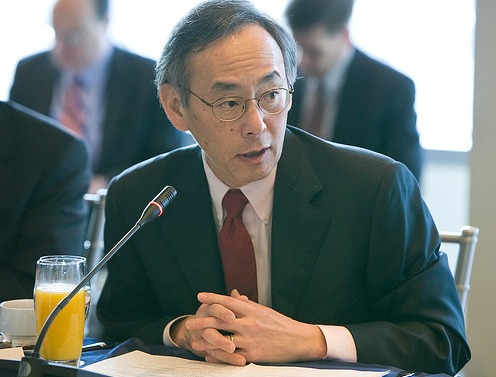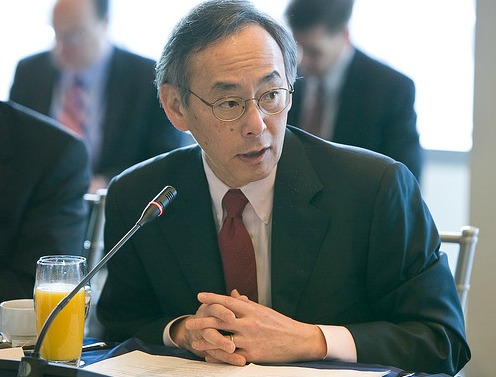 Energy Secretary Steven Chu.Photo: Center for American Progress Action FundIt’s easy to overthink the problem of climate change skepticism, to get caught up in sophisticated theories about the psychology of communication. (Er, guilty.) But the question of how to influence public opinion does have some simple answers. One thing that changes people’s minds is receiving signals that trusted people and institutions are in agreement on an issue, that it’s no longer contested, that it’s socially “safe” to accept it. This is why the right’s strategy has been so brilliant — they haven’t convinced the public that climate is a hoax, they’ve just managed to maintain the impression that it’s contested, controversial.
Energy Secretary Steven Chu.Photo: Center for American Progress Action FundIt’s easy to overthink the problem of climate change skepticism, to get caught up in sophisticated theories about the psychology of communication. (Er, guilty.) But the question of how to influence public opinion does have some simple answers. One thing that changes people’s minds is receiving signals that trusted people and institutions are in agreement on an issue, that it’s no longer contested, that it’s socially “safe” to accept it. This is why the right’s strategy has been so brilliant — they haven’t convinced the public that climate is a hoax, they’ve just managed to maintain the impression that it’s contested, controversial.
So one thing climate hawks could do is try make it clearer how large the institutional and social consensus on climate is. Lots of times this is mistakenly construed as a need to show the size of the scientific consensus, but that’s a different thing, a scientific argument the public is utterly unprepared to adjudicate. I’m talking about consensus among non-scientists: government officials, business leaders, sports and entertainment stars, churches, neighbors. It’s when agreement becomes ambient in culture that it becomes safe to accept.
Lots of wonks and academics have convinced themselves that such a task is impossible as long as hard-core righties are determined to keep contesting the issue, but honestly, there’s plenty of stuff that hasn’t even been tried. Climate scientists have tried extremely hard to reinforce the consensus, but there are plenty of people and institutions that haven’t gotten into the game at all.
Anyway, I got to thinking all this when reading Rep. Henry Waxman’s letter to Energy Secretary Steven Chu [PDF] asking him to get more involved in educating the public:
I am writing to urge you to lead a national campaign to educate the public about the causes and dangers of climate change.
Waxman rehearses the familiar threat of climate change, the scientific consensus around it, and the recent dip in public understanding. He concludes:
Your position as Secretary of Energy and your world-renowned stature as a scientist mean you are in a unique position to speak with authority about the science of climate change and the frightening consequences of inaction. Given the stakes, I believe you have a responsibility to do so. Your voice could make an enormous difference in ensuring our nation understands the magnitude of the risks and the urgent need for a plan of action.
I doubt that an educational campaign led by Steven Chu would make “an enormous difference,” at least in the short term. At this point the battle lines are drawn and the Republicans have cast their lot with flat earthers. It’s tribal now. But converting hard-core Republicans isn’t the point.
It’s important to take a step back and view climate change skepticism in the context of a wider assault on U.S. institutions by the right. Do not forget Rush Limbaugh’s prophetic words:
We really live, folks, in two worlds. There are two worlds. We live in two universes. One universe is a lie. One universe is an entire lie. Everything run, dominated, and controlled by the left here and around the world is a lie. The other universe is where we are, and that’s where reality reigns supreme and we deal with it. And seldom do these two universes ever overlap. …
The Four Corners of Deceit: Government, academia, science, and media. Those institutions are now corrupt and exist by virtue of deceit. That’s how they promulgate themselves; it is how they prosper.
Pat Buchanan famously advised Richard Nixon to use race to “cut the Democratic Party and country in half; my view is that we would have far the larger half.” That strategy was wildly successful for Republicans, peeling racists and social conservatives off the Democratic coalition and putting the South in solid Republican hands for a generation. Then that strategy became the default strategy for the right: on virtually every issue, divide the country into good guys and bad guys and rely on gathering the bigger half (or at least the bigger half of the voting population).
Then that strategy became all they know. Then they forgot it’s just a strategy. It has since become, as Limbaugh’s quote illustrates, metaphysics. In their world, government, academia, science, and the media are all lying and only the U.S. conservative movement knows the truth. There’s the world of the elites and their institutions and the world of conservatism and the twain no longer meet. The GOP’s stance on climate is, as Ron Brownstein put it, “unmatched among major political parties around the globe, even conservative ones.” The same could be said of the broader assault on institutions. Cons no longer know or care whether they’ll end up with “far the larger half.” They’ve drunk the kool-aid. Pragmatism has gone out the window.
This presents an opportunity for climate hawks. On this issue, we already have the bigger half! The right is isolated on this, but that’s something the broader U.S. public doesn’t understand at all. They don’t understand that there’s a global consensus, not just among scientists but among the world’s governments, businesses, militaries, etc.
Part of conveying that to the public will mean bringing in nonpartisan voices. I don’t know if Chu is the right place to start, but I’m damn sure the circle needs to be widened beyond climate scientists and leftie activists.



